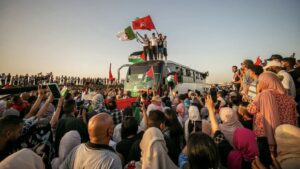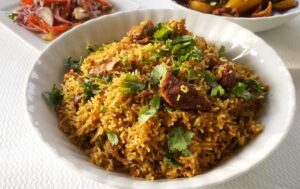
As we approach Eid al-Adha, Imam Dr A. Rashied Omar makes the call for a Sacred Solidarity.
On Eid al-Adha, we honour the sacred sacrifices of Prophet Ibrahim, his noble wife Hajar, and their blessed son Isma’il (peace be upon all of them). Their story is etched in our collective memory, not as a distant legend, but as a moral compass, illuminating the path of faith, sacrifice, and unwavering trust in Allah.
At the heart of the hajj rituals lies the anguished yet hope-filled cry of a mother searching for sustenance for her child. Hajar, left alone in the barren valley of Bakkah, did not despair. In one of the most sacred reenactments of devotion, we remember her running between the hillocks of Safa and Marwah, driven by the desperate cries of her infant son, Isma’il. With each step, she embodied faith in motion: striving, searching, and trusting in the mercy of Allah.
As we prepare to mark Eid al-Adha, those cries echo hauntingly through the devastated streets of Gaza, where Palestinian mothers cradle their emaciated, trembling children amidst rubble, beneath the relentless roar of Israeli bombs and the suffocating grip of an inhumane food blockade. The desperation of Palestinian mothers mirrors that of Hajar. Like Hajar, they run, not between hillocks, but between aid centres and bomb shelters, hospitals and ruins, seeking not just water, but the basic dignity of life, bread, safety, sleep without fear. Yet, unlike Hajar, they are met not with the mercy of Zamzam, water gushing forth from beneath their children, in response to their plea. Instead, they encounter blockade, bombardment, starvation, and the calculated cruelty of genocide.
The Zionist Israeli regime’s brutal siege has turned Gaza into a living graveyard. Babies are born into the dust of demolished homes. Mothers search in vain for clean water and a morsel of bread. Children cry out from hunger, fear, and unspeakable trauma. Yet, their tears do not fall unnoticed. Allah is al-Sami` – the All-Hearing. As we gather in safety and sufficiency to celebrate Eid, we are compelled to ask ourselves: Have we truly heeded the spiritual call of Eid al-Adha? Have we internalised its call to moral courage, to sacrifice, and to solidarity with the oppressed?
This sacred commemoration is not merely about the ritual act of animal sacrifice. It is about a call to cultivate hearts ready to sacrifice for the sake of truth, righteousness and justice. It summons us to surrender not only our comforts, but also our silences, to break them in order to speak for those being silenced by tyranny and oppression. The Glorious Qur’an reminds us: “It is neither their meat nor their blood that reaches Allah, but it is your piety (taqwa) that reaches Him.” (Surah al-Hajj, 22:37). True qurbani or udhiyya begins when we set aside our apathy and embrace our moral responsibility. It is to walk in the footsteps of Prophet Ibrahim, who was prepared to sacrifice everything for Allah, and to remember that every act of devotion must be infused with compassion, justice, and an unwavering commitment to the oppressed.
Hajar’s perseverance gave birth to Zamzam, a spring that nourishes the world to this day. Her striving was not one of passive waiting; it was an active resistance rooted in tawakkul, deep trust in Allah. We are likewise called to strive, not only spiritually, but also ethically, to stand in solidarity with the oppressed in our time. As long as Palestinian mothers are denied food and safety, as long as babies are bombed and starved, and buried beneath rubble, we cannot celebrate Eid without our hearts breaking in sacred solidarity and safety, as long as babies are bombed, starved, and buried beneath rubble, we cannot celebrate Eid without our hearts aching in sacred protest and our spirits moved to compassionate action.
Eid al-Adha, then, is a profound call to moral courage. It confronts us with searching questions: What are we truly willing to sacrifice in the pursuit of justice? What comforts, silences, or privileges are we prepared to relinquish in order to uphold the dignity of the oppressed? Just as Prophet Ibrahim was tested with the ultimate offering, so too are we tested, daily, with choices that reveal the sincerity of our faith and the depth of our solidarity.
In light of such profound ethical demands, how can we proclaim “Eid Mubarak” with full hearts while babies in Rafah cry out for milk, while mothers mourn their children in the rubble, and while Israel continues to flaunt its contempt for international law and the sanctity of human life?
In the face of such suffering, lamentation alone is not enough. Our faith demands principled action. As a global Ummah, we must raise our voices in our masajid, our homes, and our streets. We must support urgent humanitarian relief, divest from and boycott complicit corporations, engage in sustained nonviolent resistance, and pressure our leaders to end their complicity with apartheid and genocide.
Let us transform our du’as into deeds, our rituals into resistance, and our mourning into a movement for liberation. Let our takbirat rise not only in praise of Allah, but also in protest against injustice. And let our qurbani and udhiyyah be offerings that please Allah not merely in form, but in meaning. A sacrifice that makes room for prophetic action, ethical resistance, and global solidarity.
In this spirit of sacred responsibility, we raise our hands and our hearts in humble supplication: May Allah accept our worship, deepen our compassion, bring healing to the wounded, sustenance to the hungry, and liberation to the oppressed people of Palestine. May Allah make us worthy heirs of the legacy of Ibrahim, Hajar, and Ismaʿil. And may Allah answer the cries of every Isma’il, not with bombs, but with mercy, with justice and with flowing water.
Eid al-Adha Mubarak. Free, Free Palestine.











